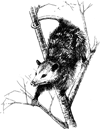Vertebrate Pest Conference: Proceedings

Vertebrate Pest Conference Proceedings: 16th (1994)
Date of this Version
February 1994
Document Type
Article
Abstract
Black bear (Ursus americanus) damage to trees is a severe problem in the Pacific Northwest. Significant damage has been observed for many years, especially in highly managed private industrial forests in western Washington. The introduction of intensive silvicultural techniques resulted in higher yields, but may have also made trees more vulnerable to black bear destruction. Early lethal control efforts lost public support and the forest products industry investigated different methods that concentrated on non-lethal management tools. In 1985, the Washington Forest Protection Association introduced supplemental bear feeding as a damage prevention program in high damage areas during the spring months. This became a very successful alternative to the earlier methods of killing bears. The supplemental feeding program has great support from land managers and the public as an economically viable additional tool to black bear population control.

